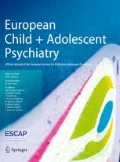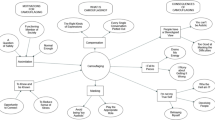Abstract
The objective of this pilot study was to evaluate the effectiveness of a group-based intervention aiming at improving social and communication skills in individuals with autism spectrum disorder. Over a period of 11 months, N = 17 children and adolescents received treatment according to the manualised Frankfurt Social Skills Training (KONTAKT). Parent, teacher, expert and blind expert ratings were assessed to judge outcome regarding peer interaction, autistic behaviours, adaptive functioning and family burden. The participants exhibited improvements pre to follow-up treatment, particularly in the area of autistic symptomatology. Effect sizes (partial eta squared) ranged from 0.02 to 0.69. Among other things, regression models showed a positive influence of IQ and language skills on gains in social skills. Findings indicate that KONTAKT might be useful for enhancing social skills and reducing autism-related psychopathology over time in different contexts. Nevertheless, controlled trials are needed to reassure its effectiveness.
Similar content being viewed by others
Notes
Detailed data on the analyses using LOCF are available upon request for interested readers
References
American Psychiatric Association (1994) Diagnostic and statistical manual of mental disorders, 4th edn. Washington, DC, Author
Barry T, Klinger LG, Lee JM, Palardy N, Gilmore T, S. Bodin D (2003) Examining the effectiveness of an outpatient clinic-based social skills group for high-functioning children with autism. J Autism Dev Disord 33:685–701
Bauminger N (2007) Brief report: group social-multimodal intervention for HFASD. J Autism Dev Disord 37:1605–1615
Bölte S, Feineis-Matthews S, Poustka F (2003) Frankfurter Test und Training des Erkennens fazialen Affekts (FEFA). Frankfurt/M., J. W. Goethe-Universität. http://www.kgu.de/zpsy/ kinderpsychiatrie/Download/index.htm
Bölte, S (2005a) Checkliste zur Beurteilung von Gruppenfertigkeiten (CBG). http://www.kgu.de/zpsy/ kinderpsychiatrie/Download/CBG.pdf
Bölte, S (2005b) Eltern-Kurzinterview zur Erfassung autistischen Verhaltens (PIA-CV-mini). http://www.kgu.de/ zpsy/kinderpsychiatrie/Download/PIA_mini.pdf
Bölte S (2005c) Soziale Kompetenzskala (SKS). http://www.kgu.de/zpsy/ kinderpsychiatrie/Download/SKS.pdf
Bölte, S (2005d) Fragebogen zur Erfassung des Gruppenverhaltens (FEG). http://www.kgu.de/zpsy/kinderpsychiatrie/Download/FEG.pdf
Bölte S, Hubl D, Feineis-Matthews S, Prvulovic D, Poustka F, Dierks T (2006) Facial affect recognition training in autism: can we animate the fusiform gyrus? Behav Neurosci 120:211–216
Bölte S, Rühl D, Schmötzer G, Poustka F (2006) Diagnostisches Interview für Autismus - Revidiert (ADI-R). Huber, Bern
Döpfner M, Lehmkuhl G (2000) Diagnosecheckliste (DCL) für Tiefgreifende Entwicklungsstörungen (TES). Diagnostik-System für psychische Störungen im Kindes- und Jugendalter nach ICD-10/DSM-IV (DISYPS-KJ). Hogrefe, Göttingen
Ehlers S, Gillberg C, Wing L (1999) A screening questionnaire for Asperger syndrome and other high-functioning autism spectrum disorders in school age children. J Autism Dev Disord 29:129–141
Endicott J, Spitzer RL, Fleiss JL, Cohen J (1976) The global assessment scale. A procedure for measuring overall severity of psychiatric disturbance. Arch Gen Psychiatry 33:766–771
Goldstein H (2002) Communication intervention for children with autism: a review of treatment efficacy. J Autism Dev Disord 32:373–396
Gresham FM, Elliott SN (1990) Social skills rating system. American Guidance Service, Circle Pines, MN
Herbrecht E, Poustka F (2007) Frankfurter Gruppentraining für Kinder und Jugendliche mit autistischen Störungen. Zeitschrift für Kinder- und Jugendpsychiatrie und Psychotherapie 35:33–40
Herbrecht E, Bölte S, Poustka F (2007) KONTAKT. Frankfurter Kommunikations- und soziales Interaktions-Gruppentraining für Autismus-Spektrum-Störungen: Therapiemanual. Hogrefe, Göttingen
Krasny L, Williams B, Provencal S, Ozonoff S (2003) Social skills interventions for the autism spectrum: essential ingredients and a model curriculum. Child and Adolescent Psychiatric Clinics of North America 12:107–122
Lord C, Wagner A, Rogers S, Szatmari P, Aman M, Charman T, Dawson G, Durand VM, Grossman L, Guthrie D, Harris S, Kasari C, Marcus L, Murphy S, Odom S, Pickles A, Scahill L, Shaw E, Siegel B, Sigman M, Stone W, Smith T, Yoder P (2005) Challenges in evaluating psychosocial interventions for Autistic Spectrum Disorders. J Autism Dev Disord 35:695–711
Marriage KJ, Gordon V, Brand L (1995) A social skills group for boys with asperger′s syndrome. Aust NZ J Psychiatry 29:58–62
Mesibov GB (1984) Social skills training with verbal autistic adolescents and adults: a programme model. J Autism Dev Disord 14:395–404
Molenberghs G, Thijs H, Jansen I, Beunkens C, Kenward MG, Mallinkrodt C, Carroll RJ (2004) Analyzing incomplete longitudinal clinical trial data. Biostatistics 5:445–464
Ozonoff S, Miller JN (1995) Teaching theory of mind: A new approach to social skills training for individuals with autism. J Autism Dev Disord 25:415–433
Poustka, F, Dziobek I., Bölte, S (2008) The level and nature of autistic intelligence revisited. Poster presented at the 7th International Meeting for Autism Research in London
Ravens-Sieberer U, Morfeld M, Stein R, Reissmann C, Bullinger M, Thyen U (2001) Der Familien-Belastungs-Fragebogen (FaBel- Fragebogen) - Testung und Validierung der deutschen Version der Impact on Family Scale bei Familien mit behinderten Kindern. Zeitschrift für Psychotherapie, Psychosomatik und Medizinische Psychologie 51:1–10
Rogers SJ (2000) Interventions that facilitate socialization in children with autism. J Autism Dev Disord 30:399–409
Rühl D, Bölte S, Feineis-Matthews S, Poustka F (2004) Diagnostische Beobachtungsskala für Autistische Störungen (ADOS). Huber, Bern
Scahill L, Lord C (2004) Subject selection and characterization in clinical trials in children with autism. CNS Spectr 9:22–32
Sheeber LB, Johnson JH (1992) Applicability of the impact on family scale for assessing families with behaviourally difficult children. Psychol Rep 71:155–159
Smith T, Scahill L, Dawson G, Guthrie D, Lord C, Odom S, Rogers S, Wagner A (2007) Designing research studies on psychosocial interventions in autism. J Autism Dev Disord 37:354–366
Stein R, Riessman C (1980) The development of an impact-on-family-scale: preliminary findings. Med Care 4:465–472
Stein R, Jessop DJ (2003) The impact on family scale revisited: further psychometric data. J Dev Behav Pediatr 24:9–16
Stone WL, Coonrod EE, Pozdol SL, Turner LM (2003) The parent interview for autism-clinical version (PIA-CV): a measure of behavioural change for young children with autism. Autism 7:9–30
Tse, J, Strulovitch, J, Tagalakis, V, Meng, L, Fombonne, E (2007) Social Skills Training for Adolescents with Asperger Syndrome and High-Functioning Autism. J Autism Dev Disord 37:1960–1968
Williams TI (1989) A social skills group for autistic children. J Autism Dev Disord 19:143–155
Williams White S, Keonig K, Scahill L (2006) Social skills development in children with autism spectrum disorders: a review of the intervention research. J Autism Dev Disord 37:1858–1868
World Health Organization (1992) The ICD-10 classification of mental and behavioural disorders. Clinical descriptions and guideline. WHO, Genf
Author information
Authors and Affiliations
Corresponding author
Rights and permissions
About this article
Cite this article
Herbrecht, E., Poustka, F., Birnkammer, S. et al. Pilot evaluation of the Frankfurt Social Skills Training for children and adolescents with autism spectrum disorder. Eur Child Adolesc Psychiatry 18, 327–335 (2009). https://doi.org/10.1007/s00787-008-0734-4
Received:
Accepted:
Published:
Issue Date:
DOI: https://doi.org/10.1007/s00787-008-0734-4




